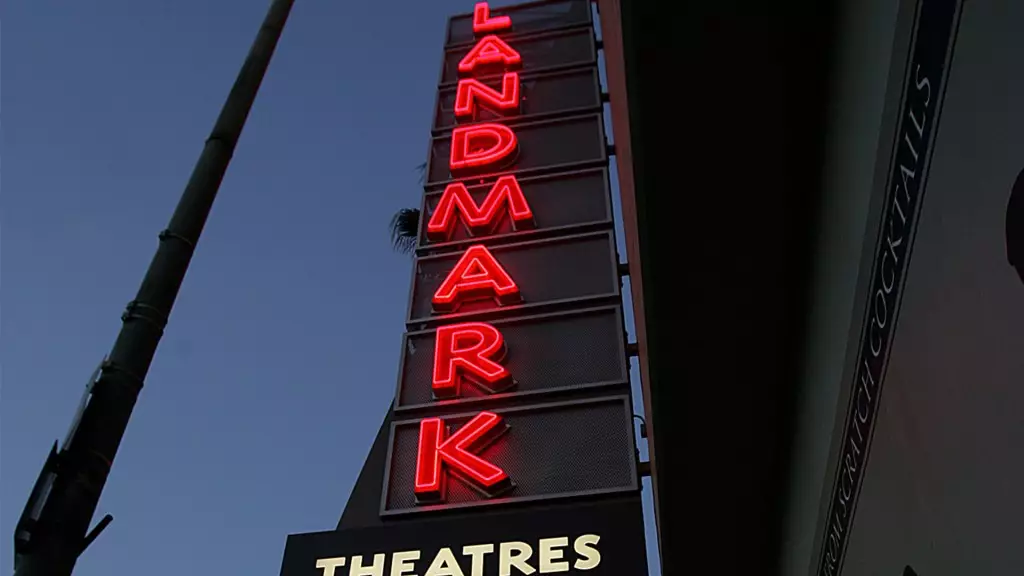The film industry has been anything but stable in recent years, particularly in the wake of the COVID-19 pandemic. Landmark Theatres stands as a testament to that turbulence, yet it is now embarking on a potential renaissance that could reshape its very identity. With substantial remodeling plans in the works for three of its flagship locations—Bethesda Row, Lagoon, and Kendall Square—Landmark is not merely patching over cracks; it’s setting the stage for a stronger comeback. The elevation of Kevin Holloway to the role of chief executive demonstrates the chain’s commitment to revitalization. Holloway brings with him a wealth of experience from illustrious names like Alamo Drafthouse and ArcLight Cinemas, suggesting that Landmark is taking this moment seriously.
In a time when streaming services threaten to further consolidate their dominance, the importance of unique, immersive cinematic experiences cannot be understated. New features and engaging designs can attract a younger audience that seeks more than just popcorn and a seat. Instead, they are looking for an environment that encourages social interaction and engagement, something Landmark seems keen to supply.
Investment or Liability?
While the renovations sound promising, one cannot ignore the skepticism surrounding their financing. Given Landmark’s precarious financial position post-pandemic—evidenced by the shuttering of 32 locations—the strategy of upgrading the existing venues raises questions. How are these expansions financed? With financial backing potentially coming from landlords, the sustainability of such investments looms large. It’s a sensible move, but it is essential to question whether it is prudent to venture back into a game that once left them financially crippled.
Landmark’s previous struggles provide a cautionary tale. The company’s decision to diversify from its indie roots to accommodate big studio releases turned out to be a double-edged sword. While aiming to attract larger audiences, it also diluted the unique experience that used to define Landmark as a brand. This pivotal moment begs the question: will the new renovations encapsulate a harmonious blend of modern appeal and the cultural touchstones that originally made Landmark a sought-after venue?
Operational Changes and Market Adaptation
Holloway’s stated intent to adapt the Landmark brand to a changing marketplace is undoubtedly commendable. It echoes a sentiment shared by many in the industry who recognize that traditional models must evolve or face extinction. But adaptation must also respect foundational values that resonate with loyal customers. Enhancing the audience experience is vital, and significant upgrades such as luxury recliner seating, modernized projections, and artisanal concession options underscore a commitment to addressing consumer expectations.
Still, one must consider whether Landmark’s efforts align with the broader entertainment landscape. Celebrities and filmmakers increasingly lean toward unique distribution channels and artistic presentations, making the traditional cinema model feel antiquated at times. While Landmark aims to foster community ties by investing in flagship theatres, the question remains: can a revamped space draw audiences away from the comforts of streaming and home viewing?
Legal Battles and Financial Turmoil: A Hindrance or Catalyst?
While the company’s plan to enhance its properties takes shape, it operates against a troubling backdrop of financial entanglements. A $534 million loan default that led to a courtroom saga underscores an unsettling theme of instability. Fortress, the lender in question, is battling to recover a staggering $187 million while allegations of asset shielding against owner Charles Cohen hang over the company like a sword of Damocles.
This legal drama poses risks that would make any executive think twice about aggressive rebranding. Yet, it also offers a reminder that the film industry is a high-stakes arena. Emotionally invested audiences want a story that is compelling both on-screen and in the financial world. The juxtaposition of the refreshing renovations against the chaotic backdrop could ultimately reinforce consumer narratives: Is Landmark truly committed to its revival, or is it merely sustaining a façade?
In the end, Landmark Theatres is at a crucial crossroads. The forthcoming renovations represent a bold attempt to reclaim a place in both the market and the hearts of moviegoers. By carefully navigating through its financial and operational challenges while preserving its cultural essence, Landmark might just emerge as more than a relic of the past—it could evolve into a beacon of modern cinema.

